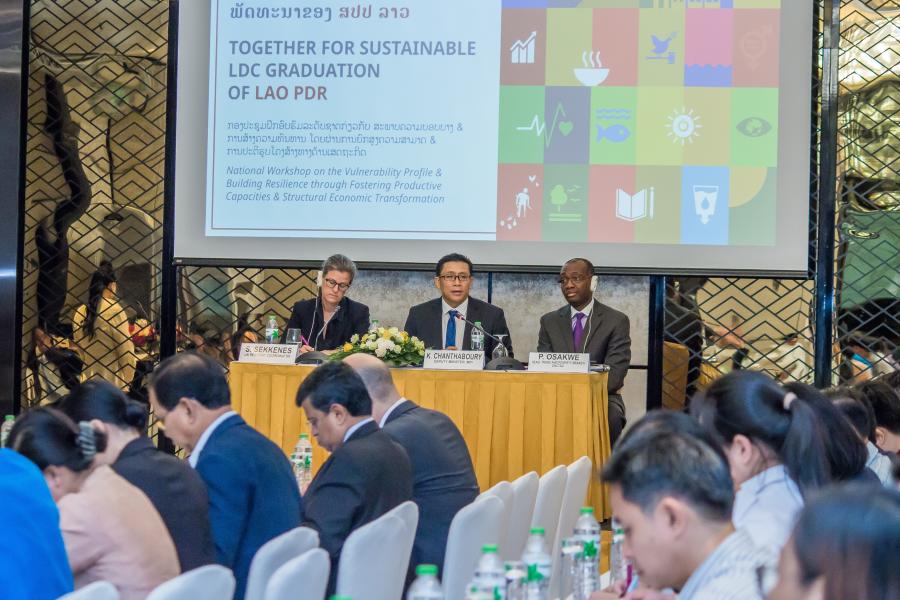Lao PDR on track to meet Least Developed Country graduation criteria for the second time
08 ຕຸລາ 2019
- At the 2018 triennial review of the list of least developed countries (LDCs) held by the Committee for Development Policy (CDP), Lao People’s Democratic Republic (PDR) met the criteria for graduation from LDC status for the first time. When a country is found eligible for graduation for the first time, under UN General Assembly resolution 59/209, UNCTAD is required to prepare a vulnerability profile of the country and to submit it as an input into the deliberations of the CDP.

Pursuant to this mandate, UNCTAD in collaboration with the Government of Lao PDR and the United Nations Resident Coordinator Office for Lao PDR organised a workshop to discuss the vulnerability profile for Lao PDR.
During the last decade, Lao PDR achieved significant gains in economic growth. Progress has also been made in education, health, life expectancy and poverty- reduction. Income per capita in Lao PDR increased from about US$ 350 in 2006 to US$ 2000 in 2018. Its Human Assets Index increased from 46.4 in 2003 to 72.8 in 2018, and the Economic Vulnerability Index decreased from almost 60 in 2009 to 33.7 in 2018. As a result of these positive developments, Lao PDR met two of the three graduation criteria in 2018.
“Driven by strong economic growth and rapidly improving health and education, Lao PDR is one of the best performers for LDC graduation in 2024. In view of LDC graduation as top priority, it is of importance to prepare a smooth transition strategy that will help Lao PDR to manage the phasing out of certain international support measures, ensuring alignment of the strategy with the overall strategies for the implementation of the 2030 Agenda and firm integration within the 9th National Socio-Economic development plan (2021- 2025). Momentum of convergence of various ongoing support to LDC graduation should be also seized for a better coordinated effort by relevant stakeholders across the Government, development partners, the business fora, academia and the UN. Among these, the UN Conference on Trade and Development (UNCTAD) provides ongoing support to the Centre for Development Policy Research in Lao PDR in coordination with UN DESA (Department of Economic and Social Affairs) and other UN agencies”, - said Ms. Sara Sekkenes, UN Resident Coordinator in Lao PDR, noting that the Vulnerability profile fits into the overall UN assistance to the Government with regards to the graduation assessment.
If present trends continue Lao PDR is likely to meet two of the three graduation criteria for the second time in 2021 review with possible graduation in 2024. Although Lao PDR is on track to meet the graduation criteria, more has to be done to ensure that graduation is inclusive and sustainable.
“In order to reduce socioeconomic and environmental vulnerabilities, the Government has implemented wide-ranging policies and measures, including promoting the diversification and transformation of the structure of the economy, and creating an enabling environment conducive for businesses in the Lao PDR” Mr. Kikeo Chanthaboury, Deputy Minister, Ministry of Planning and Investment of Lao PDR, said.
This requires strengthening efforts to broaden the sources of growth as the “diversification of the economy of Lao PDR is crucial for sustainable and effective transition from LDC to non-LDC status” Mr. Patrick Osakwe, Head of the Trade and Poverty branch of UNCTAD, said.
At the moment, the natural resources sector seems to be the key driver of growth, but this growth model is also a source of vulnerability and does not generate sufficient employment opportunities. Given the large rural population, the agricultural sector is key to improving the incomes of farmers, creating jobs in agribusiness and agro-processing, enhancing health and nutrition, and contributing to overall food security.
Another important policy action that the government needs to take is to build resilience to shocks through fostering productive capacities and mitigating, as well as adapting to environmental shocks. There is also a need for concerted efforts by the international community to continue international support to Lao PDR to ensure that graduation does not jeopardize the country’s progress towards the achievement of other national and international development goals, including progress made towards achieving the Sustainable Development Goals.
The workshop, entitled “National Workshop on the Vulnerability Profile of Lao PDR and Building Resilience through Fostering Productive Capacities and Structural Economic Transformation”, was held in Vientiane on the 8-10 October 2019 where nearly 100 senior officials, experts and practitioners, drawn from Government institutions; development partners, United Nations and other international organizations based in Lao PDR; the private sector and civil society entities took part in the national workshop.



